TMS for migraine
 Transcranial Magnetic Stimulation (TMS) is a non-invasive brain stimulation method used worldwide to make causality-based inferences about brain-behavior interactions, assess cortical reactivity, and map functionally relevant brain regions inducing a controlled current pulse in a specific cortical area. TMS is an effective technology with potential diagnostic and therapeutic uses in various diseases.
Transcranial Magnetic Stimulation (TMS) is a non-invasive brain stimulation method used worldwide to make causality-based inferences about brain-behavior interactions, assess cortical reactivity, and map functionally relevant brain regions inducing a controlled current pulse in a specific cortical area. TMS is an effective technology with potential diagnostic and therapeutic uses in various diseases.
Clinical applications of TMS have shown promising results in the treatment of a vast number of psychiatric and neurological conditions such as headache disorders – migraine being one of the most encountered. In patients with migraine, the pharmacologic therapy is divided in urgent/ abortive treatment of the attack and prophylactic one. As firstline drugs simple analgesics and non-steroidal inflammatory are preferred. Nevertheless, many individuals continue to have attacks refractory to various prophylactic and/or abortive therapies, while others are at high risk of developing medication overuse headache. Among non-pharmacologic therapies TMS has been broadly studied as a preventive migraine treatment with good outcome results.
